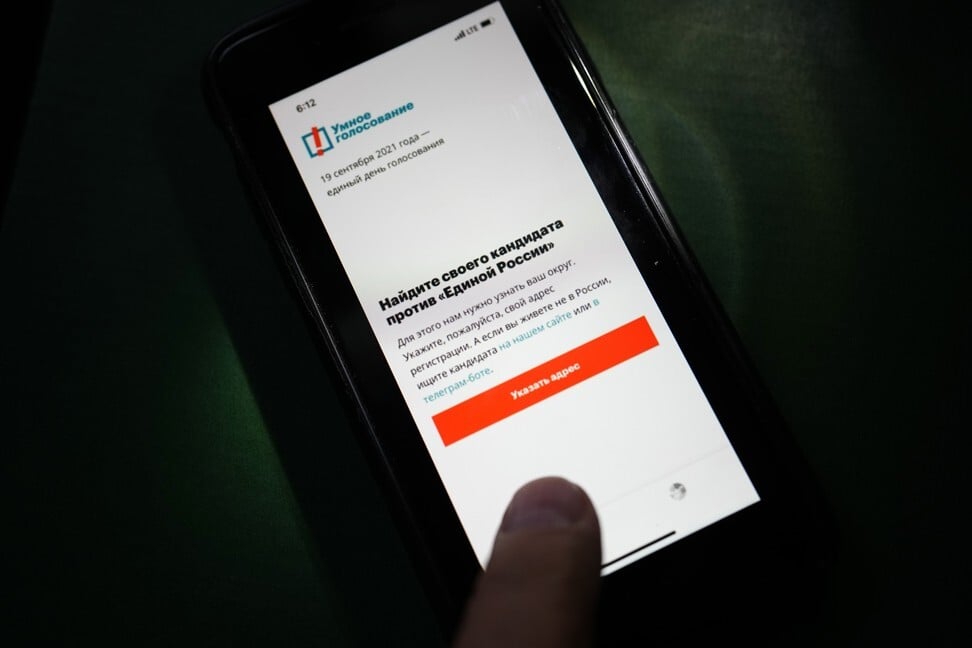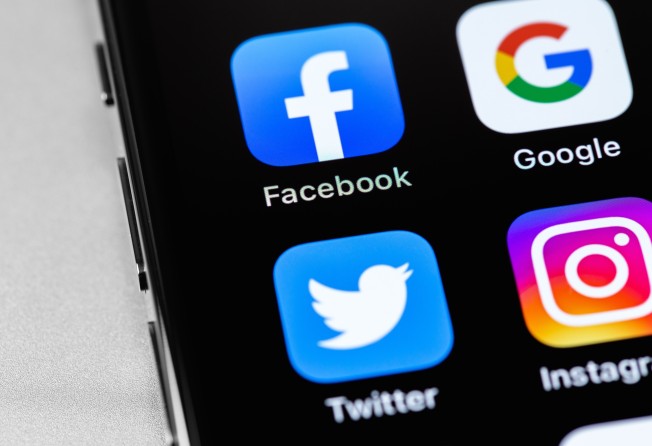
Facebook, Google and other Big Tech firms face more fines in Russia as Kremlin curbs access to information online
- Russia’s internet regulator said foreign tech firms could face amends of 5 to 20 per cent for failing to take down information judged to be illegal
- Google and Apple recently bowed to pressure to remove an app called Smart Voting after authorities accused the companies of election interference

Russia’s internet regulator is poised to significantly raise the fines it has slapped on US technology companies such as Facebook Inc and Alphabet Inc as the Kremlin escalates its push to curb access to information online.
Companies that refuse to delete content judged to be illegal in Russia could soon face amends of 5 per cent to 20 per cent of their annual local revenue, Roskomnadzor, the federal communications watchdog, said in an email Monday.
“For a number of companies that have systematically refused to comply with the agency’s legal demands, the issue of fines on revenue is being considered in the near future,” the press service said. It will also consider other means of enforcement, it said.

Russia has ratcheted up pressure on foreign technology companies amid a broader crackdown on anti-Kremlin opposition this year. Last week, Apple Inc and Alphabet’s Google bowed to pressure to remove an app, called Smart Voting, designed to help protesters vote out ruling party politicians, after authorities accused them of meddling in parliamentary elections.
The government has moved aggressively to curb access to information since the arrest of opposition leader Alexei Navalny in January following his return to Russia. Many independent media outlets have been tagged “foreign agents” and forced to close or conform to onerous reporting requirements.
While the election has served as a catalyst for recent crackdowns, the government’s recent measures are a continuation of a years-long effort to restrict the online access to information in the country.
A series of laws and regulations introduced between 2018 and 2019 expanded Russian authorities’ ability to filter internet content automatically, according to Human Rights Watch. The government required internet service providers to install equipment that can block websites, and it has also sought to restrict citizens’ access to virtual private networks, tools that are used to circumvent censorship and protect anonymity online.
In March, President Vladimir Putin said in a speech that “society will collapse from the inside” unless the internet obeyed “not just the laws of formal, legal rules, but also the moral laws of the society in which we live”. Meanwhile, Russian courts have this year repeatedly issued fines to foreign technology companies for not removing content.
Facebook has been charged 66 million roubles (US$900,000) so far this year, Twitter 38.4 million roubles and Google 26 million roubles, according to Roskomnadzor.
Russia’s demands to remove content from Google websites have rapidly increased in recent years. According to Google’s transparency reports, in 2015 the company received requests to remove fewer than 5,000 items from its websites. By 2020, that number had spiked to more than 340,000.
Both Google and Apple have also been fined for other violations. In April, Russian authorities ordered Apple to pay US$12 million for allegedly breaking monopoly laws. Meanwhile, in July Google was ordered to pay a fine of 3 million roubles for refusing to store Russians’ personal data on servers in the country. LinkedIn, which is owned by Microsoft Corp, has been blocked in Russia since 2016 for refusing to store user data locally.
Twitter was previously hit with measures that made it slow to load for failing to delete content, while Roskomnadzor this month blocked access to six virtual private network providers, including some of the world’s most popular such services, for allowing access to “prohibited” information and resources.

07:30
Why China is tightening control over cybersecurity
Prior to parliamentary elections this month, pressure on US tech companies significantly escalated. In August, Google and Apple were ordered to remove the Smart Voting app from their app stores, which they did last week. A person close to Google said officials threatened to imprison its local employees if it didn’t do so. Google and Russian search engine Yandex were separately ordered to blacklist the phrase “smart voting” in search results, according to Russian news agency Interfax.
Amid the crackdown, Putin’s ruling party maintained a parliamentary majority of more than two-thirds in last weekend’s elections, in which opponents alleged widespread fraud. Navalny’s political organisation was labelled extremist and disbanded, while many of his allies have fled the country amid the threat of criminal prosecution.
Roman Borisovich, a former Russian insurance executive who helped finance Navalny’s Anti-Corruption Foundation, said he expects the situation will continue to spiral as Russian authorities exert more control over foreign technology companies.
“They may have to close down their business in Russia or move people out of the country,” he said. “The regime is not going to return to semi-democratic process of cooperating with the opposition. It’s an all-out war.”